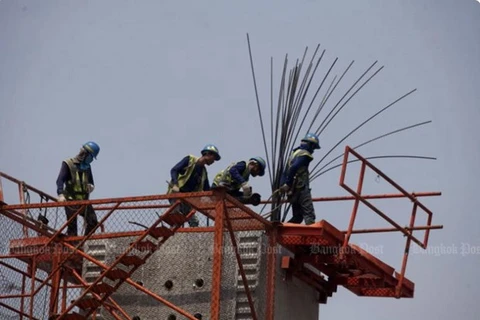 Farmers harvest rice in the field. Rice exports during the first seven months this year tallied 2.54 million tonnes with a value of 40.8 billion baht, a gain of 51.8% year-on-year. (Photo: bangkokpost.com)
Farmers harvest rice in the field. Rice exports during the first seven months this year tallied 2.54 million tonnes with a value of 40.8 billion baht, a gain of 51.8% year-on-year. (Photo: bangkokpost.com) Bangkok (VNA) – The Agricultural Economics Office of the Agriculture and Cooperatives Ministry in Thailand has forecasted a decline in rice production for the country’s 2023-24 harvest season, primarily due to the effects of the El Niño weather phenomenon.
The rice output is expected to reduce by approximately 871,000 tonnes, a decrease of 3.27%, to 25.8 million tonnes.
Deputy Secretary-General of the Agricultural Economics Department, Tantita Bunyamaneekul, reported a reduction in the country’s rice cultivation area for the 2023-24 crop year, which totalled 62.4 million rai (9.98 million ha). This is a reduction of 602,000 rai or 0.96% from the previous year. This decrease in cultivation area is largely due to changes in weather conditions, which have resulted in delayed rainfall.
According to the Thai Meteorological Department, rainfall for this crop year is expected to be lower than last year.
Mid-June to mid-July witnessed a rainfall deficit, causing water shortages in agriculture, particularly in non-irrigated dry areas. Consequently, some farmers have left their fields fallow, while others have only managed one rice crop.
The lower rainfall has also negatively impacted the yield per rai. Furthermore, there is an increased risk of disease and pest infestation, contributing to the decline in national rice production.
Despite the decrease in production, rice prices have seen a steady increase since the start of 2022 for Thai hom mali fragrant rice paddy, glutinous rice paddy, and 15% moisture content rice paddy.
The first seven months of the year also saw an increase in both the quantity and value of Thai rice exports in comparison to the same period in 2022. Exports reached 2.54 million tonnes, a 30.2% increase year-on-year, with an export value of 40.8 billion THB, up 51.8%.
Tantita has attributed the rise in domestic rice prices to growing concerns about the El Niño weather phenomenon and its potential negative impact on rice production. Moreover, the decrease in rice production in China and export restrictions from India, the world’s largest shipper, have created opportunities for Thailand to increase its rice exports./.






















